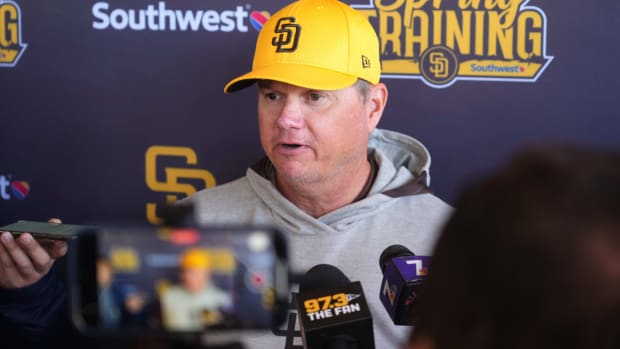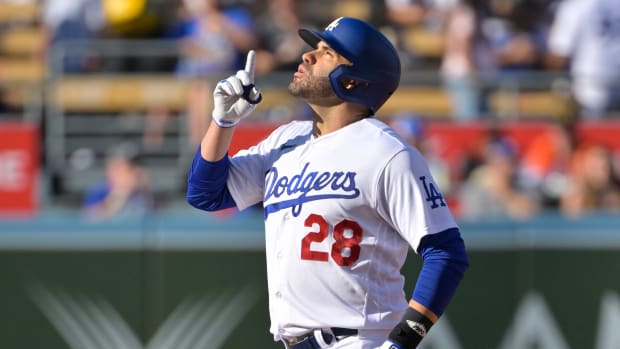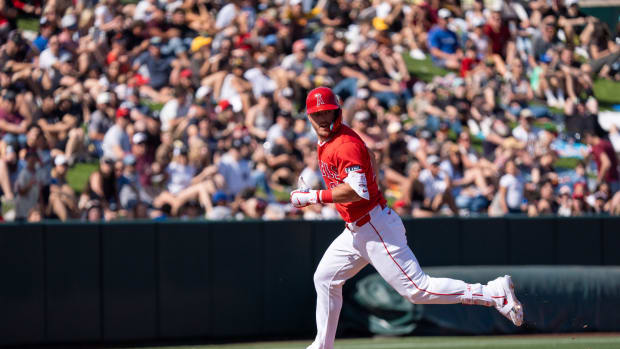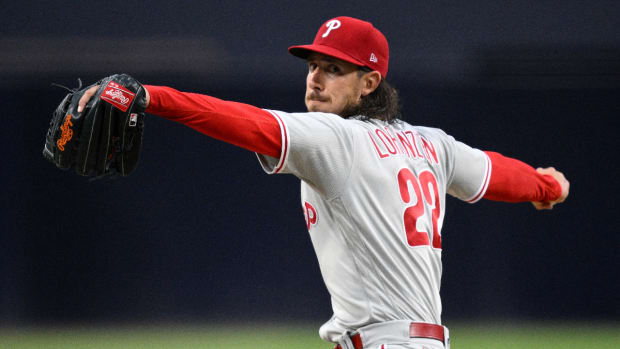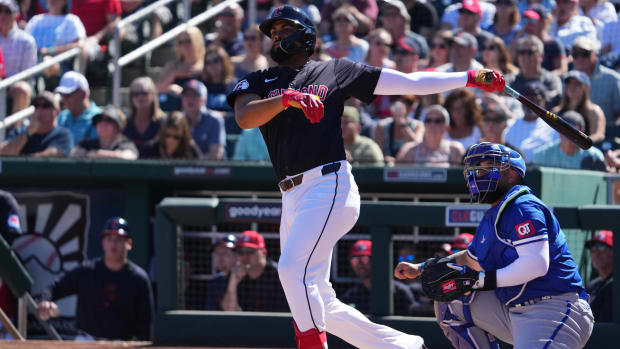Reversal of Fortune: Rusney Castillo's Megadeal With Red Sox Traps Him in Minors
This story appears in the Sept. 23, 2019, issue of Sports Illustrated.For more great storytelling and in-depth analysis, subscribe to the magazine and get up to 94% off the cover price. Click here for more.
Seven miles north of Fenway Park, Rusney Castillo slides into the driver's seat of his rented black Maserati Ghibli. It's 7 1/2 hours before first pitch, but Castillo has learned the rhythms of game days in the U.S. after the Red Sox signed him to a seven-year, $72.5 million deal in 2014. Playing for his hometown Ciego de Ávila Tigres of the Cuban league, the outfielder would show up an hour before the game. Now he tries to beat his teammates to the park.
Dressed head to toe in Nike gear and wearing a gold chain with his diamond-encrusted initials, he wheels from the garage of his apartment building onto Route 1 toward Boston. Then, 10 minutes later, he drives past the exit for Fenway Park.
If he made less money, perhaps Castillo would turn off there. But due to a rule that confuses even Castillo, the Red Sox are paying him so much that he can't play for them. So he continues along I-93 and then I-95 on his 50-mile commute to Pawtucket, R.I., home of the Triple A Red Sox. The highest-paid player in the minor leagues has made this drive more than 200 times, over five years. He knows he will make it another 70 or so in 2020, the final year of his contract. But he keeps his three-bedroom apartment in Boston because he believes that he belongs there—and that someday he will play there.
In August, Castillo won his second straight PawSox MVP award. In the four seasons since his last demotion, he has batted .294 and slugged .429. Manager Billy McMillon regularly advocates for the 32-year-old Castillo when he speaks to the player development officials. But no matter how well he performs, he will remain at McCoy Stadium, ensnared by a tax loophole no one could have foreseen. Through an interpreter Castillo explains matter-of-factly, "Anybody can [hope to] be called up but me."
When the Red Sox signed Castillo to the richest contract ever for a Cuban free agent, then-GM Ben Cherington thought he would be their centerfielder of the future. But the excellent contact skills and good power Castillo had shown in 323 games with the Tigres failed to translate. He put together an OPS of just .679 in 99 games over parts of three MLB seasons as other outfielders became fixtures at Fenway: 2011 first-round pick Jackie Bradley Jr. in centerfield, '11 fifth-rounder Mookie Betts in right and '15 first-rounder Andrew Benintendi in left.
In June 2016, Boston outrighted Castillo to Triple A, a move that also helped the team's bottom line: Under terms of the collective bargaining agreement, only the salaries of players on the 40-man roster counted toward the luxury tax. By removing Castillo's $10.5 million from that total and keeping him down for the season, the Red Sox, who were over the tax threshold and facing a 30% penalty, saved roughly $3 million.
Five months later MLB and the players' association agreed on a new CBA. Under those terms once a player is added to the 40-man roster his salary counts for luxury-tax purposes, even if he is taken off the 40-man again. Team owners wanted this to lower potential tax bills; the union's primary concern was making sure its major league members got paid. But the change proved crushing to Castillo, the rare minor leaguer making big bucks. By keeping him down, the Sox cut his eight-figure salary from luxury-tax consideration. If they had promoted him this year, they would have to pay around $7 million in taxes. They could face a similar bill for bringing him up in 2020.
Boston doesn't want to take that sort of financial hit for a part-time outfielder. (In a statement the Red Sox said Castillo "remains under contract, and we look forward to having him in the organization in 2020.") And no other team wants to pay him eight figures either, so if the Red Sox did trade him they would surely have to pick up a large portion of his salary . . . on which they would also have to pay a luxury tax. So Castillo lives in a bizarre world in which every year Boston invites him to big league spring training camp in Fort Myers, Fla.; every year he excels there; and every year he gets sent back to minor league camp.
Rusney Castillo stands in a dusty dugout in Pawtucket, wearing a shirt that says boston. While he understands his predicament, he continues to believe that he is just one good stretch away from a return to Fenway. He glues himself to MLB Network in his three-bedroom apartment and compiles makeshift scouting reports on his future opponents. He refuses to move to Rhode Island, much to the chagrin of his business manager and roommate, Hector Ramos, who often complains, "Too much driving." Castillo says Ramos will appreciate the short commute when Castillo is eventually promoted.
Sometimes he wonders how different his life would be if he made less, but he does not want to try to renegotiate his deal. He has a wife and four-year-old daughter who spend most of the year in Miami, and a seven-year-old son who lives with his mother in Cuba. This wealth means they and their children and their children's children will never go hungry, as he sometimes did as a boy growing up in Ciego de Ávila. He defected in 2013 with two goals: To strike it rich and to play in the major leagues. It is a bitter irony that the first now precludes the second.
He never shows that frustration, the people around him say. PawSox coach Bruce Crabbe, who has worked with Castillo since his 2016 demotion, marvels that Castillo is the first in the batting cage, the first on the field. "He doesn't have to do a darn thing, but he still does the same things he's done since Day One," says Crabbe. "Probably more. There are more gadgets."
Those gadgets for training—the halved bat whose pieces are connected by a chain, the inflatable platform on which he sometimes stands while in the batting cage—also got the attention of third baseman Michael Chavis, who opened the season in Triple A before being called up in April. Last month he sprained his left AC joint and a rehab assignment brought him back to Pawtucket, where he found himself even more impressed by Castillo.
"He shouldn't be here," says Chavis. "He's a big leaguer."
Castillo celebrates just as loudly as anyone else when a PawSox player receives the call that will change his life. He knows how much that dream means. He still dreams it.
Many players in Triple A make around $2,000 to $3,000 a month, rely heavily on their $35 per diem and live on air mattresses. So when a large group goes out to eat, Castillo pays. After the penultimate game of the season he rented out a Pawtucket restaurant and invited his teammates, the coaches and the front office staff, plus guests. Team officials estimate the night ran him $10,000.
Still, he receives preferential treatment: the option of reporting to the ballpark late (which he seldom takes) and of leaving early when he's not in the lineup. The team also allows him to drive with Ramos on road trips instead of taking the bus. Castillo has had two shoe deals since he signed: first Nike, then New Balance. This year he has no cleat endorsement, but he still has so many pairs left that he occasionally gifts them to teammates and coaches.
Almost no one recognizes Castillo on the streets of Boston anymore. His prime is fading quickly. But he will commit himself to one more season in purgatory: He has decided to pick up his $13.5 million option. "You're not going to cancel something when you don't have anything else," he says. (The agency representing Castillo, Roc Nation, declined to comment.)
So he will have another year of Triple A fastballs in Moosic, Pa., and Lawrenceville, Ga., another year of commuting from Boston to McCoy Stadium, until finally he can sign a contract proportional to his potential production, one that would give him a chance to play again in the major leagues. "I don't think a lot about if I make more money or less money," Castillo says. "I just concentrate on what I like doing the most in my life. That is playing baseball."































